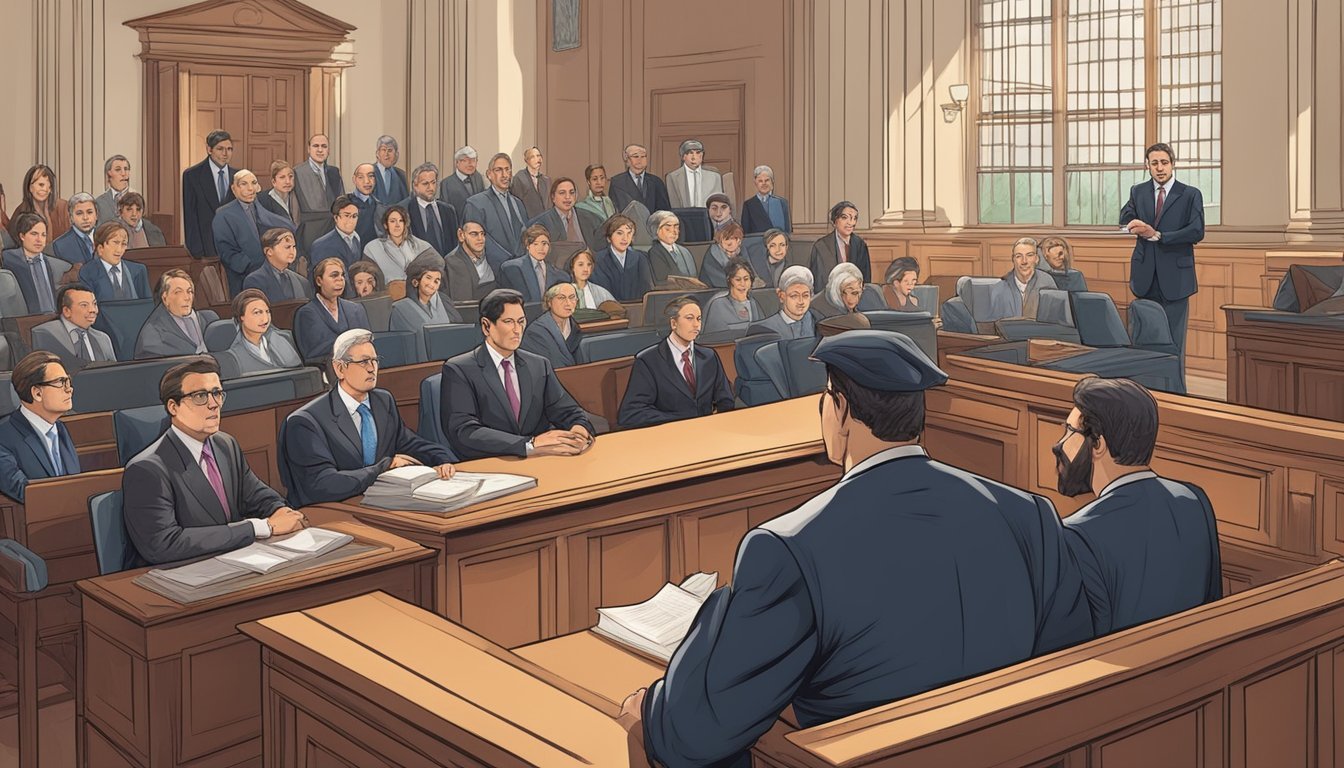Henry Lee Lucas' Last Lie: Confession Killer's Dying Denial Shocks Investigators
Henry Lee Lucas, known as "The Confession Killer," captivated America in the 1980s with his claims of murdering hundreds of people. His story became the subject of a Netflix documentary series that exposed the web of lies he spun. Lucas confessed to over 200 murders, but most of these confessions were later discredited.
The Texas drifter's fabrications led to the closure of numerous cold cases across the country. Law enforcement agencies eagerly accepted his confessions, despite a lack of concrete evidence linking him to many of the crimes. The Netflix series "The Confession Killer" delves into how Lucas managed to deceive authorities and gain notoriety.
Lucas's final act of deception came on his deathbed. After years of false confessions, he maintained his innocence in his last moments. This dying denial added another layer of complexity to the already perplexing case of Henry Lee Lucas, leaving investigators and the public to grapple with the truth behind his infamous legacy.
Profile of Henry Lee Lucas
Henry Lee Lucas was an American convicted murderer born on August 23, 1936. He gained notoriety as a self-proclaimed serial killer, earning the moniker "The Confession Killer."
Lucas was convicted of murdering his mother in 1960 and two additional people in 1983. His criminal history began early in life, with a troubled childhood marked by abuse and neglect.
In the 1980s, Lucas confessed to hundreds of unsolved murders across the United States. Law enforcement initially believed his claims, leading to the closure of numerous cold cases.
However, doubts emerged about the veracity of Lucas's confessions. Many of his statements were later proven false or impossible due to contradictory evidence and alibis.
Lucas often worked alongside Ottis Toole, another convicted killer. The pair claimed to have committed many crimes together, though the extent of their collaboration remains uncertain.
Despite his reputation as a prolific serial killer, only three murders were conclusively attributed to Lucas. His false confessions significantly impacted criminal investigations and raised questions about interrogation techniques.
Lucas died on March 12, 2001, while serving a life sentence in prison. His case continues to fascinate true crime enthusiasts and highlights the complexities of criminal psychology and false confessions.
Inception of Lucas' Infamy
Henry Lee Lucas emerged as one of America's most notorious alleged serial killers in the 1980s. His claims of hundreds of murders across the country captivated law enforcement and the public alike.
Early Life and Background
Born in 1936 in Virginia, Lucas had a tumultuous childhood marked by poverty and abuse. His mother, Viola, was a prostitute who reportedly forced him to watch her work. His father, Anderson, lost both legs in a railroad accident.
Lucas left home at 15, drifting between odd jobs and petty crimes. He served time in Michigan for burglary in the 1950s. This unstable upbringing and early criminal behavior laid the groundwork for his later notoriety.
First Murder Confession
In 1960, Lucas was convicted of murdering his mother in Michigan. He claimed it was self-defense, but evidence suggested otherwise. He served 10 years before being released on parole.
This first confirmed killing marked the beginning of Lucas' violent history. After his release, he drifted through the southern United States, engaging in various illegal activities.
Partnership with Ottis Toole
In the 1970s, Lucas met Ottis Toole in Jacksonville, Florida. The two formed a criminal partnership and claimed to have committed numerous murders together.
Their alleged crime spree spanned multiple states, including Texas and California. However, many of their confessions were later proven false or highly questionable.
The duo's partnership ended when they were arrested separately in the early 1980s. Their combined confessions would lead to one of the most complex cases in American criminal justice history.
Lucas Task Force and Investigative Techniques
The Lucas Task Force employed controversial methods to extract confessions from Henry Lee Lucas. Their techniques raised questions about the reliability of Lucas's claims and the integrity of the investigation.
Formation of Special Task Force
The Texas Rangers established a dedicated task force to investigate Henry Lee Lucas's confessions. This team, known as the Lucas Task Force, included experienced detectives and investigators. They worked closely with law enforcement agencies across the country to gather evidence and verify Lucas's claims.
The task force set up a command center in Georgetown, Texas. Here, they compiled crime scene photographs, case files, and other evidence from unsolved murders. Their goal was to link Lucas to as many cold cases as possible.
Interrogation and Confession Extraction
The Lucas Task Force used unconventional interrogation techniques. They provided Lucas with crime scene photographs and details about unsolved murders. This approach allowed him to fabricate convincing confessions.
Investigators sometimes gave Lucas tranquilizers during questioning sessions. This practice raised ethical concerns and cast doubt on the validity of his statements.
The task force's methods came under scrutiny. Critics argued that feeding Lucas information about crimes enabled him to make false confessions. This approach potentially allowed real killers to escape justice while cold cases were prematurely closed.
Controversies and Challenges
Henry Lee Lucas' case was fraught with inconsistencies and raised serious questions about law enforcement practices. His confessions and the subsequent investigations sparked heated debates in the criminal justice system and media.
Discrepancies in Confessions
Lucas' confessions often contained glaring inconsistencies. He provided details that didn't match crime scene evidence or were physically impossible given the timeframes involved. Hugh Aynesworth, an investigative journalist, uncovered numerous discrepancies in Lucas' claims.
Aynesworth found that Lucas was in Florida during some of the murders he confessed to in Texas. This revelation cast doubt on the validity of many of his confessions.
Law enforcement agencies across the country began to reassess cases attributed to Lucas. Many were reopened, leading to the exoneration of wrongfully convicted individuals.
Media and Public Perception
The media played a significant role in shaping public opinion about Lucas. Initially, news outlets reported his confessions as fact, portraying him as one of America's most prolific serial killers.
As doubts emerged, the narrative shifted. Documentaries like "The Confession Killer" exposed the flaws in the investigation process. Public perception of Lucas transformed from a monstrous killer to a manipulative liar.
The case highlighted the media's responsibility in reporting criminal cases and the potential consequences of sensationalism.
Preferential Treatment Allegations
Lucas received unusual privileges during his incarceration, raising eyebrows among critics. He was allowed to roam freely within the jail, given special food, and even provided with tranquilizers.
Jim Boutwell, the sheriff overseeing Lucas' confinement, faced accusations of providing these privileges in exchange for confessions. Critics argued this treatment incentivized false confessions.
The preferential treatment allegations further undermined the credibility of Lucas' confessions and the integrity of the investigation process. It sparked debates about ethical standards in criminal investigations and the potential for abuse within the system.
High-Profile Cases
Henry Lee Lucas confessed to numerous infamous murders, though many of his claims were later discredited. His statements drew attention to cold cases across the country and raised questions about law enforcement practices.
Case of the 'Orange Socks'
The "Orange Socks" murder gained notoriety after Lucas confessed to the crime. In 1979, an unidentified woman was found dead in Georgetown, Texas, wearing only orange socks. Lucas provided detailed information about the killing, leading authorities to believe he was responsible.
However, evidence later emerged suggesting Lucas was in Florida at the time of the murder. The victim, eventually identified as Debra Jackson, became a symbol of the controversy surrounding Lucas's confessions.
Despite Lucas's conviction, doubts persisted about his involvement. The case remained officially unsolved for decades, highlighting the complexities of relying on confessions without corroborating evidence.
Other Notable Murder Cases
Lucas claimed responsibility for several high-profile unsolved murders across the United States. He confessed to killing Jimmy Hoffa, though this was quickly dismissed as implausible.
Other notable cases included:
The disappearance of Teresa Bowman in Florida
The murder of Suzanne Rossetti in California
The killing of Sylvia Hoeks in Texas
Law enforcement agencies reopened numerous cold cases based on Lucas's statements. However, many of these confessions were later proven false through alibis, forensic evidence, or contradictory details.
The sheer volume of Lucas's murder confessions - over 600 - strained credulity and resources. It led to a reevaluation of interrogation techniques and the reliability of uncorroborated confessions in criminal investigations.
Legal Proceedings and Retribution
Henry Lee Lucas faced numerous legal proceedings following his confession spree. The Texas Rangers initially celebrated closing hundreds of cold cases based on his claims.
However, doubts soon emerged about the veracity of Lucas' confessions. Investigators like Bob Prince began to scrutinize the evidence more closely.
False confessions became a central issue. Critics argued that law enforcement had coached Lucas and provided details to bolster his stories.
As skepticism grew, some jurisdictions reopened cases Lucas had "solved." This led to retrials and exonerations in several instances.
Lucas himself recanted many of his confessions before his death. He claimed he had lied to gain better treatment and privileges while incarcerated.
The fallout damaged the reputation of the Texas Rangers and other agencies involved. It highlighted systemic issues in how confessions were obtained and verified.
Ultimately, Lucas was convicted of 11 homicides. He received a death sentence for one murder, later commuted to life imprisonment.
The case prompted reforms in interrogation techniques and evidence standards. It serves as a cautionary tale about the dangers of relying too heavily on confessions without corroborating evidence.
Lucas' Final Years and Death
Henry Lee Lucas spent his last years in prison, maintaining his innocence in most of the murders he had previously confessed to. His death in 2001 marked the end of a controversial chapter in criminal history.
Dying Denial and Last Statements
Lucas recanted his confessions to hundreds of murders before his death. He claimed law enforcement coerced him into false admissions. In 1998, then-Texas Governor George W. Bush commuted Lucas' death sentence to life imprisonment.
Lucas died of heart failure on March 12, 2001, at age 64 in a Texas prison. In his final days, he continued to deny involvement in most of the killings he once claimed responsibility for.
His last statements reinforced his position as a serial liar rather than a serial killer. Lucas insisted he had only committed three murders - his mother, Frieda Powell, and Kate Rich.
Legacy and Cold Cases Revisited
Lucas' false confessions had far-reaching consequences. His lies led to the closure of around 200 cold cases across the United States. Many of these cases were later reopened.
Law enforcement faced criticism for their handling of Lucas' claims. Critics argued that relying on his confessions allowed real killers to escape justice.
In the years following Lucas' death, advancements in DNA testing helped solve some of the cases he falsely claimed. This technology provided closure for victims' families and exposed the extent of Lucas' deceptions.
Lucas' case highlighted the need for more rigorous investigation methods and the dangers of relying too heavily on confessions without corroborating evidence.
Impact on True Crime Narratives
Henry Lee Lucas' fabricated confessions profoundly shaped true crime storytelling. His case highlighted the potential for manipulation and false narratives within the criminal justice system.
The Netflix documentary series "The Confession Killer" brought renewed attention to Lucas' story. Directed by Robert Kenner, the series examined how Lucas' lies were accepted and propagated.
Lucas' case prompted a reevaluation of confession-based investigations. Law enforcement agencies began implementing more rigorous verification processes for suspect statements.
True crime authors and documentarians became more cautious about sensationalized claims. They increasingly emphasized fact-checking and corroboration of evidence.
The incident sparked discussions about the reliability of closed case files. Many jurisdictions reopened cases that had been attributed to Lucas, seeking justice for victims and their families.
Media coverage of serial killers shifted towards more skeptical and analytical approaches. Journalists and researchers now scrutinize extraordinary claims more closely before publication.
Lucas' story underscored the importance of forensic evidence in criminal investigations. It led to increased investment in scientific methods to solve cold cases and verify confessions.
Aftermath and Victim's Families
Henry Lee Lucas' false confessions left a devastating impact on hundreds of victims' families. Many experienced a roller coaster of emotions, initially believing they had closure, only to have it ripped away.
Some families felt betrayed by law enforcement's eagerness to accept Lucas' claims without thorough investigation. This eroded trust in the justice system and left wounds that never fully healed.
For years after Lucas recanted, families of unsolved murder victims were left in limbo. They grappled with renewed uncertainty about their loved ones' fates and the knowledge that real killers potentially remained free.
The Texas Rangers faced criticism for their handling of Lucas' case. Questions arose about their interrogation methods and why they accepted his confessions so readily.
Some positive outcomes emerged from the controversy:
Improved DNA testing helped solve some cold cases
Law enforcement adopted stricter standards for verifying confessions
Advocacy groups formed to support families of homicide victims
Despite these changes, many murders linked to Lucas remain unsolved. Families continue to seek justice and closure decades later.








